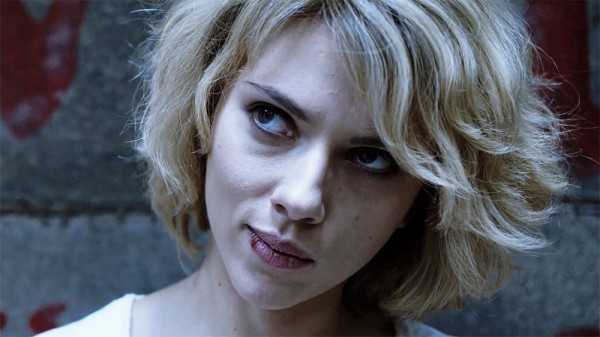Imagine you took Limitless, stripped away the internal logic, cut it with an episode of Planet Earth, and force fed everyone involved a lot of crack cocaine. You would more or less have Luc Besson’s new film, Lucy.
Our gal Lucy (Scarlett Johansson) is an American student in Taiwan who finds herself in hot water when she is kidnapped by some sadistic Korean gangsters, led by Oldboy’s Choi Min-Sik.
Lucy is forced into being a drug mule, and has a packet of a brand new synthetic drug inserted into her abdomen so she can transport it overseas. Before long a large quantity of the drug has been released into her system – mainly because sadistic Korean gangsters aren’t so smart with choosing which body parts to kick.
What happens next is hard to explain, as it makes no sense, but in a nutshell: Lucy slowly gains the ability to use 100% of her brain (not a thing, by the way), gets super-duper ridiculous God powers, and spends the rest of the film barreling around talking about the human experience, killing people and messing with every longstanding convention of good storytelling.
Dealing with big existential questions is a theme common to cinema; in the superhero genre the big ideas are relayed via characters who are larger than life, and whose power enables them to see beyond the trivialities of human existence.
The real problem in Besson’s film is that there is no consistent point of human contact to offset Lucy’s chaotic supernatural power. There is no Lois Lane to Lucy’s Superman, no Silk Spectre to her Dr Manhattan. And – to stretch that last comparison a little further – it is fairly baffling that not more was nicked from Watchmen’s big blue radioactive man.
Dr Manhattan and Lucy are both characters who go, via the path of freak accident, from human to superhuman and beyond, in the process shedding their connections to Earth. But in Lucy, there is no sense of what she has left behind, or how she feels about this sudden and overwhelming transformation.
Indeed, the only moment of emotional catharsis occurs when Lucy speaks to her offscreen mother, who is so blandly supportive and amiable we can only suspect it’s the T-1000 on the other end of the line.
Then again, this is a film in which no one, not one character, has any emotional attachment to another person on the screen. Blank-faced god-thing Lucy races through this film exploiting her random sidekicks as and when she needs them, not to mention actively murdering innocent bystanders who get in her way.
Into this mix is thrown Morgan Freeman, playing an extremely dubious scientist who says things like “From evolution to revolution!” (which, by the way, gets an inexplicable amount of applause), and a French policeman who we are told is there to remind Lucy about, like, being human and stuff. Hey Lucy! What about all those pedestrians you just mowed down? What did they remind you of?
Everything put aside, Lucy might have been salvageable if there was any reason for us to really root for our title character.
But the frustrating lack of expression in Johansson’s performance, coupled with the total absence of character development, means it is very hard for us to like our heroine, or even understand her motivation at any point in the film. And, at the end of the day, that makes an already ludicrous story entirely unbelievable.
For a film that’s about brain capacity, Lucy doesn’t do much to tickle your grey matter.
Released in UK cinemas and IMAX on Friday 22 August 2014.
> Follow Florence Vincent on Twitter.
What did you think of Lucy? Let us know below…

